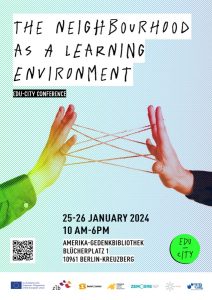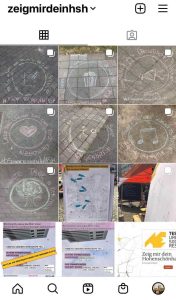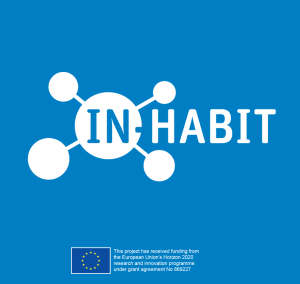Deutsch weiter unten

In December 2020 the COMENSI project comes to a closure. Community Engagement for Social Inclusion is an EU funded Erasmus+ project aimed at developing more effective methodologies of inclusion and activation of citizens at risk of exclusion. COMENSI developed and tested accessible tools and methods for communication, networking and organising to improve the capacity of citizens to engage in projects and social initiatives.
The project developed three main outputs during its 30 months duration:
- a methodological toolkit for the intervention in disadvantaged neighbourhoods;
- the prototype of a digital collaborative Neighbourhood Atlas platform as a tool for community engagement and knowledge exchange;
- the experimentation of the toolset and the atlas platform in the context of neighbourhood hubs during five local citizens labs, and a handbook based on the application of the method at local level.
In December 4th 2020 Tesserae will present for a German speaking audience the results of the process, with the German translation of the Community Engagement toolkit and the Mehringplatz Anknipsen Atlas, the online community archive created for the Südliche Friedrichstadt of Berlin.

This prototype of a digital neighbourhood atlas has many possible applications for participative urbanism, community organising and local empowerment. It is a living archive that combines data and narratives of different formats and from different sources in order to provide a dynamic picture of the identity of a neighbourhood in transformation. The atlas collects and distributes information about personal and collective storytellings, interviews to stakeholders transformative processes, heritage items or planning tools. It is used for mapping conflicts, stakeholders, local initiatives and resources, and foresees the direct involvement of citizens in its realisation.

We are convinced that such an instrument could represent a great resource for projects and communities working at local scale on inclusive urban development, social innovation, heritage, environmental justice etc. We are willing to discuss its possible applications with organisations and professionals in urban, social, economic and environmental fields. Tesserae is committed to further develop the Atlas prototype as an open source platform available for local initiatives and community projects. We consider this multiplier event on December 4th at 3pm not only as a closing event for the current project, but especially as moment of sharing and discussion with people interested in its future application within their projects and in their feedback on features that may enrich its use.
The event, planned to happen originally at the Amerika Gedenkbibliothek in Berlin, will happen online due to the Covid restriction.
The event will be followed on December 10th at 3pm by an international dissemination event for an English speaking audience, that will include the presentation of all the five atlases realised by the project in Palermo, London, Lisbon, Ljubljana and Berlin, and a panel discussion with international organisations on its possible application at policy level.
COMENSI: Präsentation des Nachbarschaftsatlas
04. Dezember, 15 Uhr
Im Dezember 2020 geht das COMENSI-Projekt (Community Engagement for Social Inclusion) zu Ende. COMENSI ist ein von der EU finanziertes Erasmus+ Projekt, das darauf abzielt, effektivere Methoden zur Inklusion und Aktivierung von Bürger*innen zu entwickeln, die von Ausgrenzung bedroht sind. COMENSI entwickelte und erprobte verschiedene Instrumente und Methoden zur Kommunikation, Vernetzung und Organisation, um die Fähigkeit der Bürger*innen zu verbessern, sich an Projekten und sozialen Initiativen zu beteiligen.
Das Projekt entwickelte während seiner 30-monatigen Laufzeit drei Hauptergebnisse:
- einen methodologischen Werkzeugkasten für den Einsatz in benachteiligten Stadtgebieten;
- den Prototypen eines digitalen kollaborativen Nachbarschaftsatlasses als Instrument für gemeinschaftliches Engagement und zum Wissensaustausch;
- die Erprobung des Werkzeugkastens und der Atlasplattform mit Büger*innen im Rahmenvon fünf Workshops vor Ort sowie ein Handbuch, das die Anwendung der Methoden auf lokaler Ebene beschreibt.
Am 04. Dezember 2020 wird Tesserae die Ergebnisse des Prozesses einem deutschsprachigen Publikum vorstellen: Präsentiert wird hier der Werkzeugkasten “Gemeinschaftliches Engagement” und der Nachbarschaftsatlas „MehringplatzAnknipsen“, der ein Online-Gemeinschaftsarchiv für die Südliche Friedrichstadt Berlins darstellt. ..
Dieser erste Prototyp eines digitalen Stadtteilatlasses bietet zahlreiche Anwendungsmöglichkeiten für eine partizipative Stadt, Community Organizing und lokales Empowerment. Es handelt sich um ein lebendiges Archiv, das Daten und Erzählungen in verschiedenen Formaten und aus verschiedenen Quellen kombiniert, um ein dynamisches Bild der Identität eines im Wandel begriffenen Gebietes zu vermitteln.Der Atlas verbindet und sammelt Informationen verschiedener Art zur Südlichen Friedrichstadt wie persönliche und kollektive Geschichten, Interviews mit lokalen Akteur*innen, Informationen über transformative Prozesse, kulturelle Güter oder stadtplanerische Instrumente.Er kann somit für die Kartierung von Konflikten, von Akteur*innen, von Themen, oder auch von lokalen Initiativen verwendet werden und sieht die direkte Beteiligung von Bürger*innen und Akteur*innen an der Umsetzung vor.
Wir sind überzeugt, dass ein solches Instrument eine großartige Ressource für Projekte und Gemeinschaften darstellen könnte, die auf lokaler Ebene an integrativer Stadtentwicklung, sozialer Innovation, kulturellem Erbe, Umweltgerechtigkeit usw. arbeiten. Wir sind bereit, mögliche Anwendungsbereiche des Atlasses mit Organisationen und Fachleuten aus dem urbanen, sozialen, wirtschaftlichen und ökologischen Bereich zu diskutieren. Tesserae hat sich verpflichtet, den Atlas-Prototyp als Open-Source-Plattform weiterzuentwickeln, die für lokale Initiativen und Gemeinschaftsprojekte zur Verfügung steht. Wir betrachten diese Multiplikator*innenveranstaltung am 04. Dezember nicht nur als Abschlussveranstaltung für das laufende Projekt, sondern vor allem als einen Moment des Austauschs und der Diskussion mit Menschen, die an seiner zukünftigen Anwendung innerhalb ihrer Projekte interessiert sind.
Die Multiplikator*innenenveranstaltung , die ursprünglich in der Amerika Gedenkbibliothek geplant war, wird aufgrund der Covid-Beschränkungen online stattfinden.
Bitte melden Sie sich unter an Eventbrite
An die Veranstaltung in deutscher Sprache schließt sich am 10. Dezember um 15 Uhr eine internationale Multiplikator*innenveranstaltung für ein englischsprachiges Publikum an, bei der alle fünf Atlanten vorgestellt werden, die im Rahmen des COMENSI-Projekts in Palermo, London, Lissabon, Ljubljana und Berlin realisiert wurden. Daran wird sich eine Podiumsdiskussion mit internationalen Organisationen über die möglichen Anwendungsbereiche des Atlasses auf politischer Ebene anschließen.


